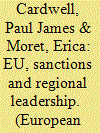| Srl | Item |
| 1 |
ID:
190056


|
|
|
|
|
| Summary/Abstract |
Sanctions have become the “go to” mechanism for addressing foreign and security challenges in the international arena. The European Union’s willingness to impose autonomous (or unilateral) restrictive measures on third countries, and in particular on Russia, has come to the fore at a time when the uptake of new sanctions through the United Nations (UN) framework has stalled. This trend appears to reflect a growing ability to forge consensus among the EU's Member States and use its economic power to support its foreign policy goals. This article considers the extent to which the EU has succeeded in forging a leadership role in sanctions for itself among non-EU states. It examines the alignment or adoption by non-Member States with its sanctions regimes and finds that the EU has a demonstrable claim to regional, if not yet global, leadership.
|
|
|
|
|
|
|
|
|
|
|
|
|
|
|
|
| 2 |
ID:
158023


|
|
|
|
|
| Summary/Abstract |
As the UK and EU enter the second phase of Brexit negotiations, during which their future relationship should be defined, questions over UK–EU cooperation in the security field are becoming more salient. Indeed, the UK and EU are reportedly seeking to fast-track a security and defence deal to allow a move to a new relationship straight after the UK’s departure from the union.1 EU security cooperation takes many forms, including joint action on illegal immigration and terrorism, and policies on sanctions and defence. Whereas most security areas will be governed by new or existing frameworks, such as NATO and various bilateral arrangements, the future of joint work on sanctions faces substantial risk.
|
|
|
|
|
|
|
|
|
|
|
|
|
|
|
|